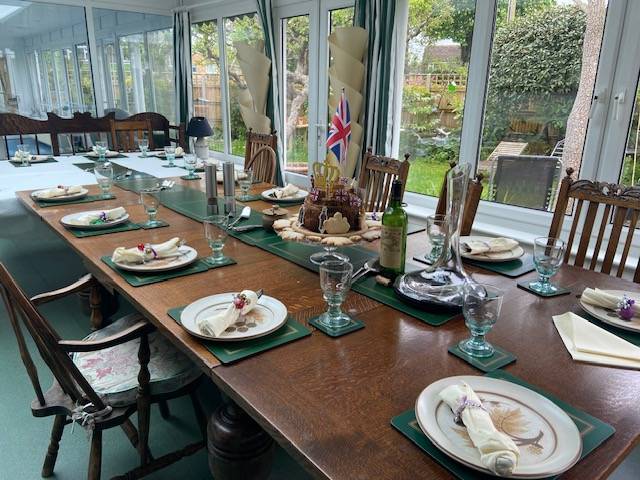Aunt Hilary decorated another Coronation cake for the weekend’s local neighbourhood lunch. Masses of delicious dishes contributed by all for a long happy session of talk and laughter. I’d cooked a vacuum-packed gammon joint (skin removed but trussed with string) in the water bath at 70C for about 12 hours. De-bagged, patted dry and brushed with our own honey before roasting for 10 minutes 200C, Gas 6: dead easy and numerous servings.
As I write, the sous-chef is out on a mission to collect a bee swarm: high in a dense shrubby bush. He’s up a ladder hoping that a little cool smoke will encourage them to follow their queen into the “skep” (beekeepers’ large basket for swarm collection). Then hopefully back to the pre-prepared brood box where the workers will produce wax to make the familiar comb in which the queen can lay new eggs. Those eggs will be fed with nectar and pollen collected by the foraging flying bees. That’s the theory anyway but, first, the new colony needs to be quarantined in case they are carrying any undesirable bee diseases.
Swarming is the bees natural reproduction method. When the old queen gets frisky at this time of year, she wants to get out and about to start a new colony. She’s already laid eggs that are being turned into new queen cells in the original hive. Now she’s ready to spread her wings, along with a sizeable number of her previous offspring which, together, make the swarm.
Meanwhile, back in the original hive, hopefully at least one of the “new” queens will emerge and take to the air. She’ll be following the pheromone “scent” of the male drones from across a very wide area. Those drones all get together in a congregation site (often the same location for hundreds of years) where they vie with each other to contribute to the new queens’ sperm collection. It’s the last thing those drones do before a raffish backwards somersault and death. That come-hither new queen stores up the sperm of numerous drones for later use and returns, with a smile on her face, to her original hive. She’ll be laying her own eggs in their thousands over the coming months, not going out again until she too feels frisky in about a year. And so procreation continues: the new queen in her original quarters, the old one hopefully checking out the new.
The beekeeper’s life isn’t all honey and sweetness as swarm collection is an evening escapade, often up ladders and battling through the vegetation. The worse aspect is that he doesn’t have a clue about the pedigree of the old queen and her swarm. They could be wonderfully calm and productive or an angry brood ready for a fight.

